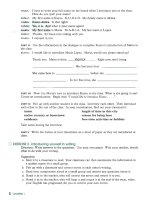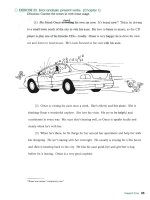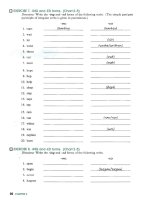Fundamentals of english grammar third edition part 9 docx
Bạn đang xem bản rút gọn của tài liệu. Xem và tải ngay bản đầy đủ của tài liệu tại đây (422.39 KB, 7 trang )
Toshi
(walk)
over to the window. Oscar
(point)
31
32
out one bicydist in particular. This bicyclist
(sreo)
with
one
33
hand whiie he
(drink)
a soda with the other.
At
the same
34
time, he
(weave)
in and out of the heavy tratFc. To Oscar,
35
the bicyclist
(seem)
fearless.
36
Oscar
([earn, never)
how to ride a bike when he
(be)
37
a child, so Toshi
(offer)
to teach him. Oscar
38
39
(aWt)
gladly.
40
EXERCISE
20.
Verb tense and irregular verb review. (Chapters
1
and
2)
Directiuns:
Complete the sentences with the verbs
in
parentheses. Use the simple past,
simple present, or past progressive.
(1)
Once upon a time, a
king
and his three daughters
(rive)
lived
ina
castle
in
a faraway land. One
day
while the
king
(think)
. .
was
thi~knq
about his
daughters, he
(have)
had
an idea. He
Cfm)
Forwwd
a
plan for finding husbands for them.
131
(2)
When it
(come)
caw
time for the three daughters to marry, the
king
(announce)
awwkrzced
his plan. He said, "I'm going to take three jewels to
the fountain
in
the center of the village. The young men
(meet)
nee+*
together there every day. The three young men who find the jewels will become my
daughters' husbands."
(3)
The next day, the
king
(choose)
three jewels-an emerald, a
ruby, and a diamond-and
(take)
them into the village. He
&Id)
them
in
his hand and
(walk)
among the young
men. First he
(drop)
the emerald, then the ruby, and then the
diamond.
A
handsome man
(pick)
up the emerald. Then a wealthy
prince
(spot)
the ruby and
(berm)
down to pick it up. The king
(be)
very pleased.
!I
XIhe
simple present is used bae because the story
is
giving
the
king's
exact
words
in
s
quorntion. Norise that
quorsdon marks
(".
.
!')
ace
used. See Cban
14-8,
p.
420,
for more information about quorntiona.
44
CHAPTER
2
(4)
But then a frog
(hop)
toward the diamond and
(pick)
it up. The frog
(bring)
the diamond to
the king and said,
"I
(be)
the Frog Prince.
I
(claim)
your third daughter as my wife."
1!
(5)
When the king
(relo
Tina, his third daughter, about the Frog
Prince, she
(refuse)
to marry him. When the people of the land
(hear)
the news about the frog and the princess, they
(laugh)
and
(laugh)
.
"Have you heard the news?" the
people
(say)
to each other. "Princess Tina is going to marry a frog!"
(6)
Tina
(feel)
terrible. She said,
"I
(be)
the unluckiest person in the world." She
UaU)
to the floor and
(sob)
.
No one
(love)
her, she
(believe)
.
Her father
(understand,
not)
her. She
(hide)
from her friends and
(keep)
her pain in her heart. Every day, she
(gmw)
sadder and sadder. Her
two sisters
(have)
grand weddings. Their wedding bells
(rink,
with joy across the land.
.> ii
(7)
Eventually, Tina
Gave)
the castle. She
(run)
away hm her family and
(go)
to live in the
woods by herself. She
(eat)
simple food,
(drink)
water from the lake,
(cut)
her own firewood,
(wash)
her own clothes,
the floor herself,
(make)
her own bed, and
(take)
care of all her
own needs. But she
(be)
very lonely and unhappy.
(8)
One day Tina (go)
swimming. The water
(be)
deep and cold. Tina
(swim)
for a long time and
(become)
very tired. While she
(swim)
back
toward the shore, she
(lose)
the desire to live. She
(quit)
-
trying
to swim to safety. She
(drown)
when the frog suddenly
(appear)
and with all his suength
(Push)
Tina to the shore. He
(save)
her life.
(9)
"Why
(save,you)
my life, Frog?"
"Because you
(be)
very young and you
(have)
a lot to live for."
"No,
I
(do,
not)
,"
said the princess.
"I
(be)
the most miserable person
in
the whole universe."
,:I,
,,,*
(10)
"Let's talk about it,"
(say)
the frog. And they
(begin)
r
-'
to talk. Tina and the Frog Prince
(sit)
/L
:
together for hours and hours. Frog
(listen)
and
(understand)
.
He
(telI)
her about himself and his own
46
CHAPTER
2
unhappiness and loneliness. They
(share)
their minds and hearts.
Day after day, they
(spend)
hours with each other. They
(taw
,
(laugh)
,
(play)
and
(work)
together.
(1 1) One day while they
near the lake,Tina
(bend)
down and,
with
great affection,
(lziss)
the frog
on his forehead. Poof! Suddenly the frog
(cur)
into
a
man!
He
(take)
Tina in his arms, and said, "You
(save)
me
with
your kiss. Outside,
I
(look)
like a frog, but you
(see)
inside and
(find)
the
real
me. Now
I
(be)
free.
An
evil
wizard had turned me into a frog
until
I
found the love
of a woman with a truly good heart!' When Tina
through
outside appearances, she
find)
me love.
(12)
Tina and the prince
(return)
to the castle and
(get)
married. Her two sisters, she discovered,
(be)
very unhappy. The handsome husband
(ignore)
his wife and
(talk,
not)
to her. The wealthy husband
(make)
fun
of his wife and
(giwe)
her orders all the time. But Tina and her
Frog Prince
(live)
happily ever after.
EXERCISE
21.
Past time. (Chapter
2)
Directions:
Write a story that begins "Once upon a time,
. . .
."
Choose one:
1.
Invent your own story. For example, write about a lonely bee who finds happiness,
a poor orphan who succeeds in life with the help of a fairy godmother, a hermit who
rediscovers the joys of human companionship, etc. Discuss possible story ideas in class.
2.
Write a fable that you are familiar with, perhaps one that is well known
in
your
.
culture.
3.
Write a story with your classmates. Each student writes one or two sentences at a
time. One student begins the story. Then he or she passes the paper on to another
student, who then writes a sentence or two and passes the paper on-until everyone
in
the
class has had a chance to write part of the story, or until the story has an ending. This
story can then be reproduced for the class to revise and correct together. The class may
want to "publish" the final product on the Internet or in a small booklet.
1
2-10
EXPRESSING PAST TIME: USING TIME CLAUSES
I
t
ouse
main
clause
(a)
I4ffm
Ifinrrned
my
work,'
'I
wenr
w
bed.
I
main clause time clause
@)
I
I
went
to
bed
I
Iqfter Ifinishod
my
work.
I
(c) I went to bed
4frsr Ifinished
my
work.
(d)
Befire
I
went
to
bed,
I
finished my work.
*&!
(e)
I
srayed up
until Ifinished
my
work.
(f)
As
soon as Ifinished
my
work,
I
went to bed.
(g)
The phone rang
while
I
war
watching TV.
(h)
When
the
phone
rnw
I
was watching
TV.
;,I
?r!:
1,awJ
I
lcij:,~
.!<;::
,-,
.$:n
:
. . .
(9 When the phone
rang,
I
answered
it.
-
(i)
Whiie I
was
doing
my homework, my
roommate
was wutchingTV.
Afrer
Ifinished
my
work
=
a time clause*
I went
w
bed
=
a
main clause*
(a) and
@)
have the same meaning.
A
time clause can
(1)
come in
•’rant
of a main dause, as in (a).
(2)
follow
a
main clause, as in
(b).
These words introduce time dauses:
ltfro+
i.
-+.
&
until
befm
1
+
:bject and
werb
=
a
time clause
as soon
as
while
when
In
(e):
und=
"to that time and then no longer"**
In
(f):
as
soon
as
=
"immediately after"
PUNCTUATION:
Put a comma at the end of a time
clause when the time dause comes first in
a
sentence
(comes in front of the main clause):
time clause
+
comma
+
main
clause
main
clause
+
NO
comma
+
time
clause
In a sentence
with
a time clause inuoduced by
when,
both the time clause verb and the main verb can be
simple past. In this case, the action in the
when-
clause happened first.
In
(i):
Firsc
The phone
mng.
Then:
I
answered it.
In
(i):
When two actions
are
in progress at the same
time, the past progressive can be used
in
both parts
of the sentence.
'A
ehurs
is
a
suucture
that
has
a
subjen
and
a
wrb.
"Until
can
alsa
be
used
to
say
that
something
dm
NOT
happen
befox
a
particular
rime:
I
didn't
go
w
bpd
wLil
Ifbruhed
ny
wrk.
,a,,.
>I2
_
>.),,.,
I>,,
'*"
EXERCISE
22.
Past
time
clauses. (Chart
2-10)
Ditectim:
Combine the two sentences into one sentence by using time clauses. Discuss
correct punctuation.
1.
Firsc
I got home.
Then:
I
ate dinner.
+
After
. .
OR
.
. .
after
.
.
After
I
got
home,
I
are
dinner.
OR
I
ate dinner
ajier
I
got home.
2.
First:
I unplugged the coffee pot.
Then:
I left my apartment this morning.
+
Before
.
.
OR
. . .
before
. .
3.
First:
I lived on a farm.
Then:
I was seven years old.
-t
Until
. .
OR
.
until
.
4.
First:
I heard the doorbell.
Then:
I opened the door.
,
.
',
+
AS soon as
. . .
.
OR
.
. .
as soon as
.
.
:
'
5.
First:
The rabbit was sleeping.
Then:
The fox climbed through the window.
-r
While
. .
OR
.
while
. .
+
When
. .
OR
.
.
.
when
. .
.,
,
.
,
,
6.
First:
It began to rain.
'
'
.
Then:
I stood under a tree.
'
'
-r
When
. . OR . .
.
when
.
.
7.
At the same time:
I was lying in bed with the flu.
My friends were
swimmiig
at the beach.
-r
While
. .
OR
. . .
while
. .
EXERCISE
23.
Past
time
clauses. (Charts
2-1
+
2-10)
Directions:
Complete the sentences using the words in parentheses. Use the simple past or
the past progressive. Identify the time clauses.
1.
My mother called me around
5:OO.
My husband came home
a
little after that.
[When he
(come)
caww
home,]
I
(talk)
r*r#
takiw
to
.,
my mother on the phone.
2.
I
@try)
a small
gift
before I
(go)
to the
hospital yesterday to visit my friend.
3.
Yesterday afternoon I
(go)
to visit the
Smith
family. When I
(get)
there around two o'clock,
Mrs.
Smith
(be)
in
the yard. She
(plant)
flowers in her garden.
Mr.
Smith
(be)
in the garage. He
(cork)
on their car. He
(change)
the oil. The children
(play)
in the front yard. In other words, while
Mr.
Smith
(change)
the oil in the car, the children
(play)
with a ball in the yard.









